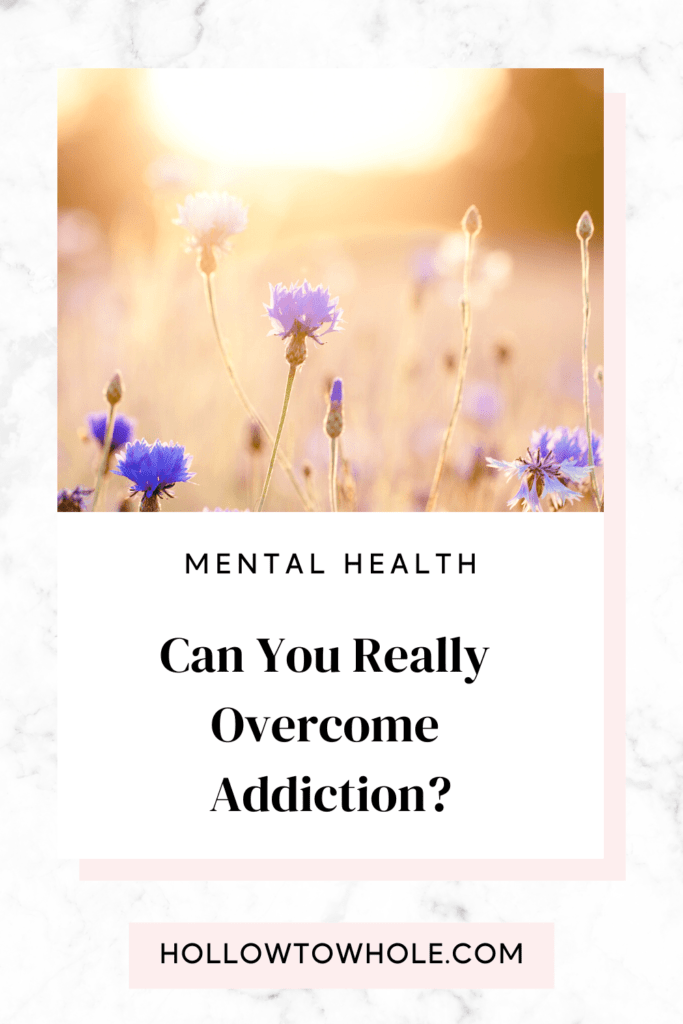Can You Really Overcome Addiction?
You can’t help someone who doesn’t want to be helped? True or false?
In my opinion, neither.
Pause here and save this pin for later!

Disclosure: This post may contain affiliate links. If you click and purchase, I may receive a small commission, at no extra cost to you. Learn more here
Can You Really Overcome Addiction?
I used to believe addiction was something only the individual themselves could fix and that “you can’t help someone who doesn’t want to be helped.”
In other words, that sounds like a you problem.
This was before I had any understanding of what addiction was and how much it affected addicts within their environment.
Deep inside, they need that social support; something to live for, someone to run to and without that, the road to recovery may not be possible.
Also to be considered are the people who are affected by someone’s addiction, watching someone you love self-sabotage and trying everything within your power to help them only to watch them slip away again is just as painful as being the addict themselves.
When you’re invested in helping someone get off drugs, you go through the same emotional rollercoaster they do. The same highs, the same lows.
The only difference is they can “escape” and you cannot.
An individual’s will power to get sober is one thing but the bigger thing is their environment. If they have overcome the addiction themselves but not their environment then eventually they will fall back into their old habits because the environment is so seductive.
I used to believe an individual’s actions and behaviours stemmed from only within themselves and the environment had some influence but ultimately would not outweigh the individual’s desires.
I found that to be not entirely true. Environmental stimuli can affect one’s biological, chemical and neurological state; a field of study called Epigenetics.
This new area of study states that it is the environment that signals the gene and that genes can be turned on and off based on what the individual is sensing in their external environment.
Every thought we have, every action we take and every experience we encounter creates a neurological link in our brain.
If we are continuously exposed to the same circumstances then those neurological pathways become more hardwired, to a point where it becomes unconscious.
Similar to you driving the same route to work every single day. Your mind will eventually “shut off” and you arrive to work wondering how you even got there.
That’s your nerve cells being hardwired.
So why do people relapse? Why is it so hard to get over addictive behaviour?
Because the majority of the time, it’s unconscious.
When you’ve been doing the same activity over and over and over again, your nerve cells fire faster and faster each time.
For someone to change their behaviour they must be consciously aware of their unconscious habits in combination with their will power to stop and think before their body takes over their mind.
That’s part one of recovery.
Part two is the environment.
The type of environment that is available to someone and the type of environment they choose to surround themselves in is so powerful it can alter gene sequences that can be passed onto future generations.
For an individual to truly change, they must be greater than their environment and the seductions that come with it.
There is always a glimmer in those who have been through the dark
atticus
I’ve always wondered why there are some people who can use illicit drugs here and there and never get addicted and yet a handful of people will use it once and become addicted for life.
Until recently, understanding about this topic has opened up new research looking at the human genome and how our genes are able to dictate our lives; our thoughts, habits, beliefs and perceptions.
Epigenetics allows us to understand our entire human genome and how our genes can be altered and even modified by external factors (How Understanding an Individual’s Epigenetics Can Help Measure and Test Addiction, 2017). An individual’s lifestyle and choices are intimately connected with what is in their environment.
Whatever they are sensing on a biological level activates certain genes to turn on and may always stay on, where other genes are completely turned off for long periods of time and this is where the body is knocked out of chemical equilibrium and headed straight for disease.
An article by the National Institute of Drug Abuse (2019) states, “environmental exposures or choices people make can actually “mark”—or remodel—the structure of DNA at the cell level or even at the level of the whole organism”.
Future treatment options are now taking a leap into pharmacogenomics, where they “harness the power of genomic information to improve treatments for addiction by tailoring the treatment to the person’s specific genetic makeup” (National Institute of Drug Abuse, 2019).
This type of precision medicine is the definition of client-centered treatment, as humans are so multifaceted, it would only make sense to have treatment options customized down to the very cell.
Due to the reason that environment has such a huge impact, an article by What is Epigenetics (2017) states that the information we absorb into our DNA can influence an individual’s risk for addiction and their ability to respond to certain types of treatment.
This means that if we can positively condition an individual’s environment, then we can control what gets absorbed into our DNA. Numerous studies have been able to “show that a person’s health is the result of dynamic interactions between genes and the environment” (National Institute of Drug Abuse, 2019).
All of these things that appear to be on the outside of the individual is essentially affecting what is happening to them on the inside on a cellular level.
By controlling how we think, what actions we take and what we allow in from external factors is the first step in true recovery.
If we can fully understand how our body’s work in response to our environment then we can begin to create recovery by remodeling our external factors.
This part of recovery is fully dependent on creating a new environment; one where they can live in a community of healthy and positive thinking that will sustain a gratifying life and help refrain from relapse.
The significance of social support especially from family and friends is highly overlooked.
For example, a mother who is an addict who has lost her children to the foster system is not allowed to see or talk to her children as it will “destabilize” the child’s progress.
If you take everything away from someone, what is their reason to live? What do they have to look forward to? What will motivate them to change?
With nothing, she will return back to her old ways.
Whether you’re a substance user or not, community, social connections and environment play a huge role in our lives affecting our cellular make up and genomic sequence.
When an individual is ready to change and their heart is open, we can begin to guide their thinking process and rewire their neurological pathways so that the number of positive pathways outnumber the negative until it becomes unconscious.
Addiction is not a solitary issue
Leaving an addict to fend for themselves is the worst thing someone can do as loneliness is when the devil creeps in.
On the surface, they will continue to push people away and isolate. Sometimes they act out of fear, anger, resentment, dissatisfaction with themselves and because they do not know how to deal with those emotions and they cannot get in control of their lives, they quarantine themselves.
When friends and family see this, they give into that outer emotion and let themselves be pushed away, when most people with addiction do not want to be alone.
Deep down they want to have someone there for them, they want to know they are still loved but they just do not know how to express that or are not always coherent enough to show it.
The difference in coping is that people with addiction can “escape” while friends and family cannot. They cut them off as a coping mechanism for themselves because it is easier not to deal with the pain.
What they do not know is that pushing them away only makes it worse, leading them down a path of darkness.
The lifelong challenge is to teach friends and family how to live and cope with someone who has addiction and help them understand the emotions they go through and what they mean; getting them to stay by their side, never giving up and always having hope.
Thanks for stopping by 
Share your thoughts on addiction in the comments below!

Like this post? Save this pin!









Winston
December 5, 2020Hey guys, I just wanted to see if you need anything in the way of site editing/code fixing/programming, unique blog post material, extra traffic by getting others to start sharing your site across their own social media accounts, social media management, optimizing the site, monetizing the site, etc. I have quite a few ways I can set all of this and do this for you. Don’t mean to impose, was just curious, I’ve been doing this for some time and was just curious if you needed an extra hand. I can even do WordPress and other related tasks (you name it).
Stay Safe,
Winston
1.708.320.3171
Samantha Phan
February 2, 2021Hi Winston,
Appreciate you stopping by & thanks for letting me know!